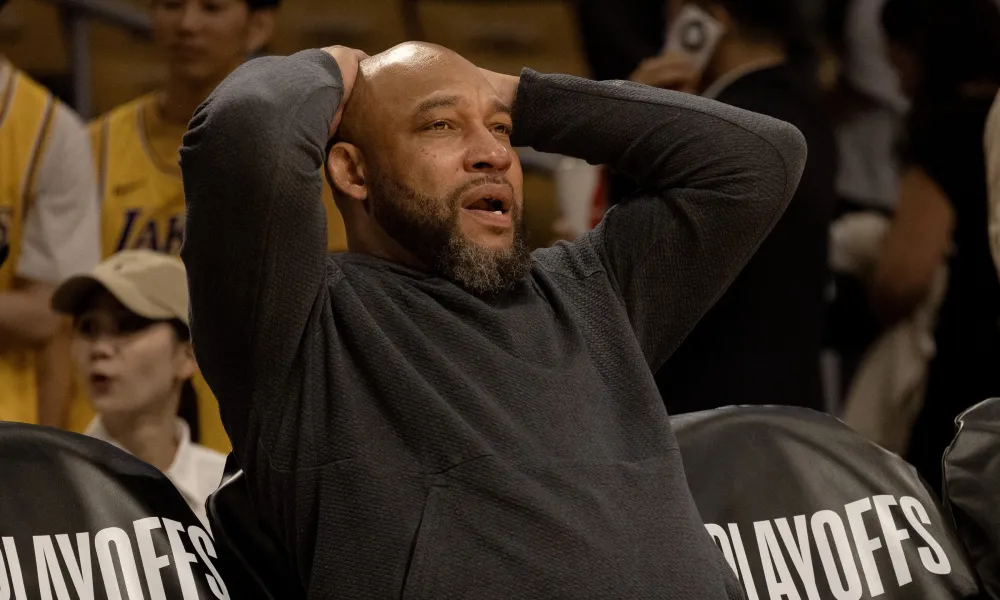The Los Angeles Lakers have parted ways with head coach Darvin Ham after this year’s playoff disappointment. Under Ham’s tenure, the Lakers achieved a commendable run to the Western Conference finals in his first season, only to fall short of the championship expectations in his second, marking a pivotal moment for the team and its high-profile roster, including LeBron James.
The Lakers’ coaching change, their fourth since LeBron James joined the team and the eighth in the 14 seasons following Phil Jackson’s departure, underscores the franchise’s ongoing quest for success in the post-Kobe Bryant era. As speculation swirls around potential replacements, with names like JJ Redick and Ty Lue being mentioned, the Lakers’ coaching saga highlights the high stakes of NBA playoffs performance and the relentless pursuit of excellence in professional basketball.
This coaching change after facing elimination by the Denver Nuggets for the second consecutive season, emphasizes the urgency within the Lakers organization to return to its championship-winning ways.
Lakers fire Darvin Ham: Key Reasons for the Decision
Darvin Ham’s tenure as head coach of the Lakers was marked by several critical issues that ultimately led to his dismissal. Throughout the season, Ham faced significant criticism for his handling of game rotations and strategic decisions, which often did not adapt swiftly enough during matches. Notably, his defensive strategies and in-game adjustments were seen as inadequate, particularly during high-stakes situations in the playoffs.
Tensions within the team also contributed to the decision. There were evident strains between Ham and key players, including LeBron James. This was highlighted during playoff games where Ham chose not to challenge referee calls that James believed were incorrect, exacerbating the discord. Additionally, Ham’s relationship with the players deteriorated over the season, with reports suggesting that he had lost the locker room, leading to questions about his leadership and communication skills.
The handling of player roles and minutes was another area of concern. Ham’s decisions regarding player rotations, especially in critical games, were often questioned. His management of players like D’Angelo Russell and Rui Hachimura, and the inconsistent role of Austin Reaves, despite his promising performances, were seen as missteps that affected team performance and morale.
Despite leading the Lakers to one round from the NBA Finals in his first season, the expectations were much higher in his second season. The team’s failure to advance further, combined with a relatively healthy roster including stars like Anthony Davis and LeBron James, added to the mounting pressure for a change.
In summary, the combination of strategic mismanagement, poor communication, and inability to fully harness the team’s potential were key factors that led to the decision to part ways with Darvin Ham.
Impact on the Team and LeBron James
The dismissal of Darvin Ham as the head coach of the Lakers marks a critical juncture for the team, particularly affecting its key player, LeBron James. With the Lakers’ recent playoff disappointments and James approaching the latter stages of his illustrious career, the decision could significantly influence his future with the franchise.
LeBron, who has a $51.4 million player option for the upcoming season, now faces a pivotal decision that could see him either commit to the Lakers’ new direction under a different coach or explore opportunities elsewhere as a free agent.
The urgency for championship success is palpable, given that the Lakers were expected to be strong contenders. However, consecutive first-round playoff exits have raised questions about the team’s strategy and roster efficacy.
For LeBron James, who turns 40 in December, the window for securing another NBA title is narrowing. The new coach will thus need not only to lead the team to its 18th championship but also to build a robust rapport with high-profile players like James, Anthony Davis, and potentially Russell Westbrook, ensuring that their talents are harnessed effectively for a successful playoff run.
Furthermore, the team dynamics and morale will need careful management, especially after reports of discord under Ham’s tenure. The Lakers’ front office will also have to navigate potential trade options and contract negotiations astutely, as these decisions will be crucial in shaping the team’s path forward and its appeal to LeBron James in this decisive phase of his career.
Potential Coaching Replacements
In the wake of Darvin Ham’s departure, the Lakers are considering several seasoned candidates for their next head coach. High on the list are Mike Budenholzer and Terry Stotts, both known for their extensive experience and ability to manage star-studded teams.
Budenholzer, a two-time NBA Coach of the Year, has a proven playoff pedigree with a championship win in 2021, while Stotts boasts a solid regular-season record and has navigated teams through the playoffs multiple times.
Moreover, the Lakers are also looking at internal options, such as Phil Handy, who, despite his lack of head coaching experience, has been a significant presence in the NBA for nearly 15 years and has a strong rapport with LeBron James. Handy’s deep understanding of player dynamics and his previous success with the Lakers could make him a compelling choice.
Another intriguing option is Juwan Howard, former University of Michigan head coach, known for his strong connections within the NBA and his recent desire to return to the league. His familiarity with Lakers’ general manager Rob Pelinka and past experience playing alongside LeBron James could be advantageous.
The decision is critical as the Lakers’ leadership aims to find a coach capable of melding high-profile personalities into a cohesive unit poised for championship success. This strategic move is pivotal not only for the team’s immediate success but also for maintaining stability within the franchise that has seen frequent coaching changes over the past decade.
The departure of Darvin Ham from the head coaching position of the Lakers marks a significant turning point for the franchise, emphasizing their continuous pursuit for excellence amidst the pressures of playoff performance. Through the tenure of Ham, the Lakers have confronted strategic, communicational, and leadership challenges, which, ultimately fell short of the franchise’s illustrious championship aspirations.
This shift underlines not only the high expectations placed on the team’s coaching staff but also the dynamic and demanding nature of managing a team laden with high-profile talents and personalities.
As the Lakers venture into a new chapter, the selection of the next head coach becomes paramount to harnessing the potential of star players such as LeBron James and Anthony Davis, and guiding the team back to its championship-winning ways. The implications of this decision stretch far beyond the immediate season, potentially defining the team’s trajectory in the coming years and significantly influencing LeBron James’s career path.
In such a competitive and ever-evolving landscape, the Lakers’ next moves will be closely watched, holding the promise of renewed strategies, revitalized team dynamics, and, the franchise and its fans hope, a return to the pinnacle of NBA success.




